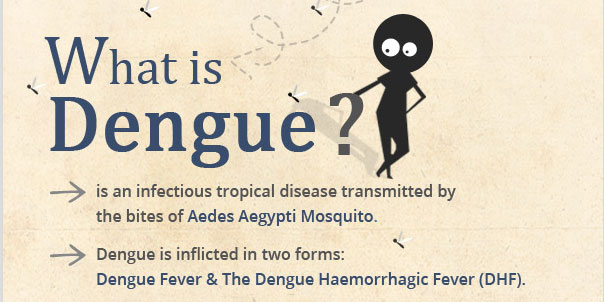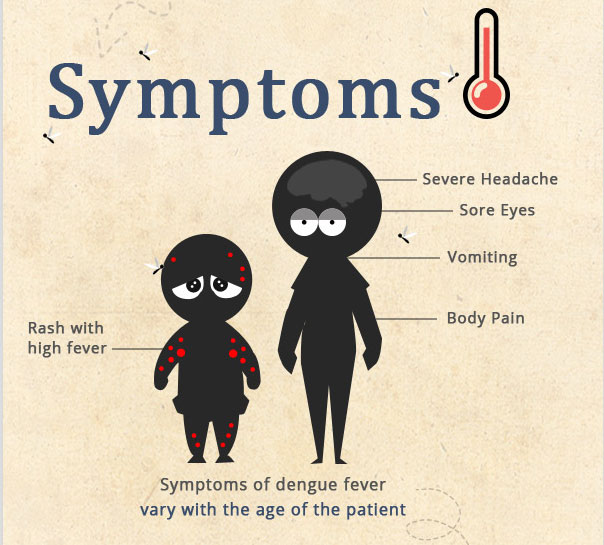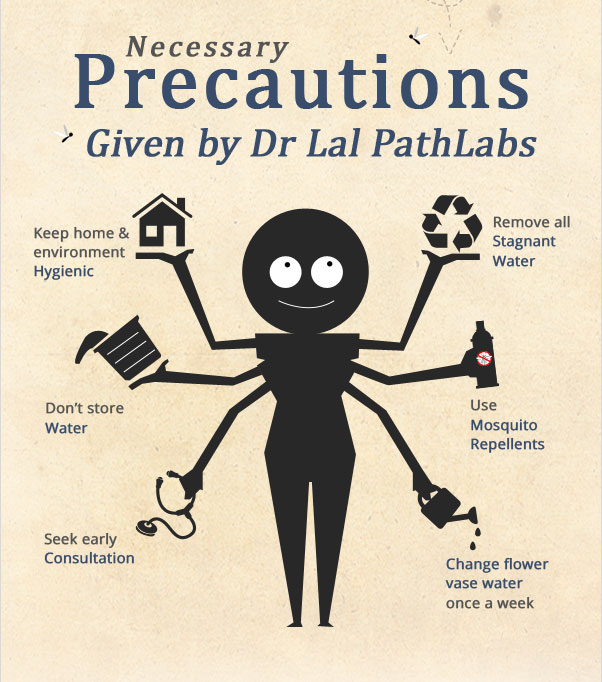Dengue – Types, Symptoms and Preventive Measures
- 29 Jul, 2016
- Written by Team Dr Lal PathLabs
Medically Approved by Dr. Seema
Table of Contents

It’s that time of the year, again. Pouring rains have provided the much-needed respite from the scorching heat. But along with the downfall in the temperatures, rains also bring a plethora of mosquito-borne diseases.

Mosquitoes are known to carry many infectious diseases- Dengue- is known to be one of the fatal ones. “Aedes aegypti”, a type of mosquito is the principal transmitter. The mosquito is known to be very sensitive to environmental factors such as temperature, precipitation and humidity, therefore, increases the probability of infection with the change in temperature.
Generally there are five types of Dengue virus. First, four of them are referred to as- DENV-1. DENV-2, DENV-3 and DENV -4.Mosquitoes which spread dengue generally bite during the day, particularly in the morning and evening where only a single bite can result in infection.
Dengue accounts for approximately 25000 deaths every year. It has been estimated that approximately 2.5billion people i.e. two –fifths of the world population are at risk of getting affected with dengue. The disease has become endemic in nature in more than 100 countries. Popularly known as ‘break bone fever’ or ‘Dandy fever’, there are some important points to know about this fatal disease: [show_more more=”Continue Reading ▼” less=”Show Less ▲”]
- Dengue mosquito, Aedes aegypti prefer to bite indoors primarily during the day.
- The biting behavior of this mosquito is peculiar. It can bite one without being noticed and usually it approaches from behind and bites mainly on the ankles and elbows. Only female mosquito bites to obtain blood to lay eggs.
- The mosquito lay eggs during the day in water containing organic material, like decaying leaf, algae, etc.
- Dengue is a febrile illness with symptoms appearing 3-14 days after the infective bite.
- Dengue is inflicted in two forms:
– Dengue Fever
– Dengue Haemorrhagic Fever (DHF), which is complicated, a severe and more dangerous form of Dengue. Haemorrhagic affected in the areas of skin (easy bruising), gums and gastrointestinal tract.
Dengue Fever Symptoms

The symptoms of dengue usually start occurring from fourth to seventh days, after the initial infection starts ranging from mild to severe. It is noteworthy that symptoms of Dengue fever vary with the age of the patient. Sometimes, Dengue symptoms are mild, and one can mistake these for flu or another viral infection. Younger children and people who never had this infection before, tend to have a milder infection as compared to those with a second or subsequent dengue infection.
The symptoms generally last for about ten days and can include:
- Sudden high fever
- Severe headache
- Swollen lymph glands
- Severe joints and muscle pain
- Skin rash (Appear between two to five days after the initial fever)
- Mild to severe nausea
- Mild to severe vomiting
- Mild bleeding from nose and gums.
- Bruising on skin
- Febrile convulsions
- Pain behind the eyes
- Drowsiness or irritability
- Pale, cold and clammy skin
- Difficulty in breathing
In some cases, the symptoms get worsened and can become life-threatening as well. Blood vessels often become damaged and leaky resulting in the drop of the number of clot-forming cells (platelets) in the bloodstream. This can lead to:
- Heavy bleeding from the mouth and nose
- Sharp pain in abdominal area
- Persistent vomiting for a long time
- Bleeding under the skin, that might look like bruising
- Problems in the lungs, liver and heart.
Complexities of Dengue Fever: Haemorrhagic Fever
Small percentage of individuals who suffer from dengue fever can develop a more severe form of disease known as dengue haemorrhagic fever. The risk factor for developing dengue haemorrhagic fever include:
- Presence of having antibodies to dengue virus from the previous infection
- Being under the age of 12
- A weakened immune system.
In this case, the blood vessels or capillaries become excessive leaky, allowing the fluid component to escape from the blood vessel. This situation can lead to the collapse of the circulatory system and eventually may result in death without prompt and appropriate treatment.
Tests and Diagnosis
Diagnosing dengue fever can be a difficult task because its signs and symptoms are confusing with those of other diseases such as malaria, leptospirosis, typhoid fever, etc. However, listed below are some of the tests that can be done to diagnose the condition:
- Antibody titer for Dengue virus types
- Complete blood count (CBC) Test
- Polymerase Chain Reaction (PCR) test
Preventive Points

A common phrase used in medical parlance is ‘Precaution is the best cure’. There is no vaccine to prevent dengue fever. Also, there are no appropriate medications that can target the dengue virus directly. The best method of precaution is to avoid mosquito bites and to reduce the mosquito population. Below are few precautions which if followed can minimise the chance to get infected with the lethal viral disease.
- Avoid densely populated residential areas.
- Keep your home and environment hygienic. If your surroundings are clean, there will be no room for the mosquitoes to breed.
- Mosquitoes breed at stagnant water places. So do not store water in empty containers. Throw away or recycle water-holding containers that are not in use. Change flower vase container weekly. Check for hidden water bodies like manholes, septic tanks, clogged drains, wells, etc.
- The areas where still water can collect such as, birdbaths, pet dishes, empty planters, flower pots, cans, etc., should be checked, emptied or changed regularly.
- Use mosquito repellents on exposed skin.
- Use air conditioning instead of opening windows.
- Use mosquito net if sleeping areas are not covered.
- Wear long sleeve clothes and long pants when mosquitoes are most active (primarily during the day).
- Make sure windows and door screens are secure and free of holes.
- Seek early consultation, if experienced with Dengue symptoms.
A timely detection can help in the proper treatment of this lethal disease. If you or your loved ones happen to experience any of the symptoms mentioned above, do not take it lightly. Visit your nearest Dr Lal PathLabs to get your tests done or avail special home collection and testing service. [/show_more]













